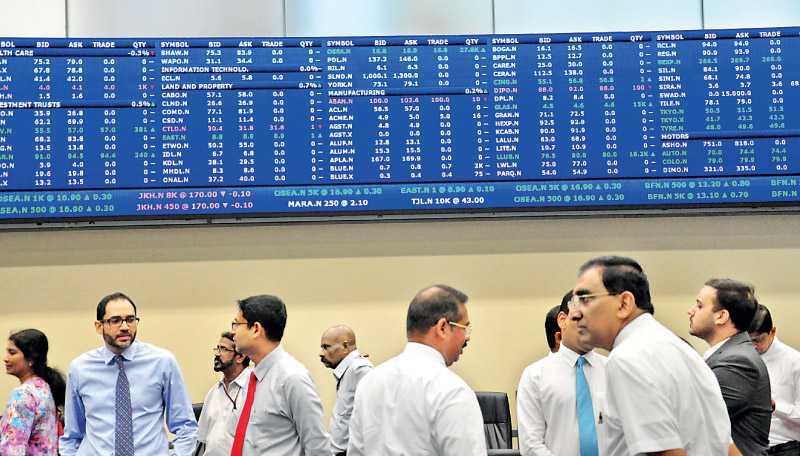Saturday Dec 13, 2025
Saturday Dec 13, 2025
Thursday, 18 February 2021 00:22 - - {{hitsCtrl.values.hits}}

Not everyone is happy with the recent stock market trends in Sri Lanka. The debate over the sustainability of the market has been raging for some time. Small and first-time investors, who burned their hands during the market crash in 2011 are starting to ask whether this is the start of another bubble. Although there is no obvious clear answer to this valid concern, time will tell
By An Economist
 It is not so seldom that a stock index is used as a barometer for the economy.
It is not so seldom that a stock index is used as a barometer for the economy.
The intuition behind the relationship is straightforward: a stock index is affected by economic fundamentals and economic shocks. When the economy is growing, investor confidence in the economy begins to rise and equities become more attractive.
This textbook explanation clearly contradicts the sharp rise in equities in emerging and frontier markets, amid COVID-19 fuelled recession. In Sri Lanka, for example, the stock market index is climbing when the real economy is in a pathetic position.
Nobody will dispute the fact that the country's economic position is untenable, at least in the near-term. The Central Bank of Sri Lanka reckons that the economy is likely to have contracted by around 3.9% in 2020 and struggles to contain the economic impact of the COVID-19 through the unprecedented policy stimulus measures; despite there being an immediate risk of a surge in inflation.
S&P Global, a ratings agency, estimates that net general Government debt will exceed 100% of GDP in 2021 and downgraded the country’s sovereign rating to junk status citing “risks to debt servicing capacity have risen” late in 2020. The downgrade was followed by the rating cut of both Fitch and Moody’s, another two ratings agencies. Neither the currency nor public finance is strong.
The stock market, by contrast, is sitting at all-time highs. The benchmark All Shares Price Index (ASPI) of the Colombo Stock Exchange (CSE), the stock exchange in Sri Lanka, the best performing stock exchange in the world in 2009, has rebounded much faster than the rest of the economy and indicated a remarkable gain of 104% by end January, since failing to its lowest point in a decade in May. The ASPI reported 16.73% TYD growth.
So, what prompted the stock market to rise? The most widely cited reason is the prevailing low interest rate regime.
Low interest rates might affect stock markets in two ways. First, it could drive corporate earnings to new levels reducing finance cost and increasing business activities. Second, failing real interest rates, in other words inflation-adjusted interest rates, prompt investors to switch from fixed income asset classes to equities. Although both ways can inflate prices, it is needless to say that the stock prices adjusted by fundamentals are more sustainable than demand pull prices.
At the same time, it is widely believed that stock markets are forward looking and thus the rise of stock prices are based on future earnings potentials of the listed companies. Thus, it appears that investors are overly confident about their abilities to predict the future.
Nevertheless, it’s always worth remembering that the stock market is not the economy, but only a portion of the economy. Especially in developing countries such as Sri Lanka, micro, small and medium enterprises (MSMEs) are considered as the backbone of the economy.
On the other hand, the size of the stock market is relatively small. For instance, market capitalisation of all the listed companies of the CSE accounted for 20% of the country's GDP, in December 2020. In fact, compared to the large publicly listed companies at the stock market,
MSMEs are more vulnerable in times of economic shocks such as COVID-19, as they have limited access to capital markets. Although MSMEs are an essential part of the real economy, they have little to do with the stock market. Besides, only less than 4% of Sri Lankans have invested in the stock market. Therefore, the stock market is not necessarily a good indicator of the economy as a whole.
Not everyone is happy with the recent stock market trends in Sri Lanka. The debate over the sustainability of the market has been raging for some time. Small and first-time investors, who burned their hands during the market crash in 2011 are starting to ask whether this is the start of another bubble. Although there is no obvious clear answer to this valid concern, time will tell.
It is no surprise that the number of new investors in the market has correspondingly increased. Apparently, they are unsophisticated investors who have been attracted by the current market boom. History suggests that unsound market booms are often a result of irrational investor behaviour and excessive credit.
Given this worrying situation, the regulator can intervene in order to protect unsophisticated investors and the recommended cure is market awareness and credit control.
(The writer is an economist and can be reached at [email protected])